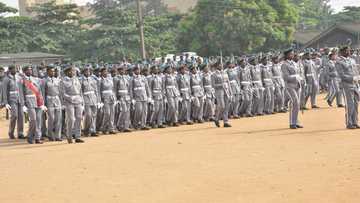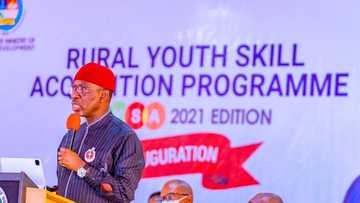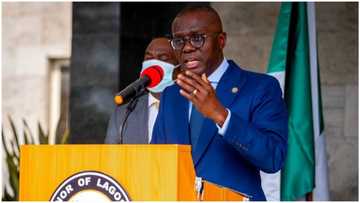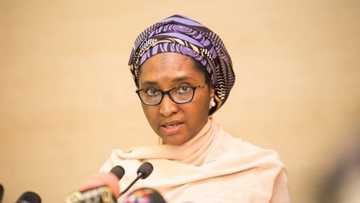While Camps Will Be Closed, IDPs Return To Communities Is Voluntary, Borno SEMA Says
- The protection of civilians in the time of conflict or crisis is quite paramount in reducing the effect of military operations on citizens
- Borno state government have continued to partner with stakeholders including civil society organisations to ensure civilian protection
- The state government said there would be the provision of rent subsidy and allowances for returning internally displaced persons
PAY ATTENTION: Click “See First” under the “Following” tab to see Legit.ng News on your Facebook News Feed!
With announcements that the Borno state government plan to close all internally displaced persons (IDPs) camps by December 31, the State's Emergency Management Agency (SEMA) has said that return to communities by the displaced persons would be voluntary.
The chairperson for SEMA, Hajiya Ya Bawa Kolo, disclosed at the launch of the report, 'Civilian Protection Snapshot: Gwoza Nigeria' by the Centre for Civilians in Conflict (CIVIC) in Abuja on Wednesday, December 15.
The report, a research project funded by the European Union reviews military strategies and protection activities for civilians caught up in conflict-affected areas.
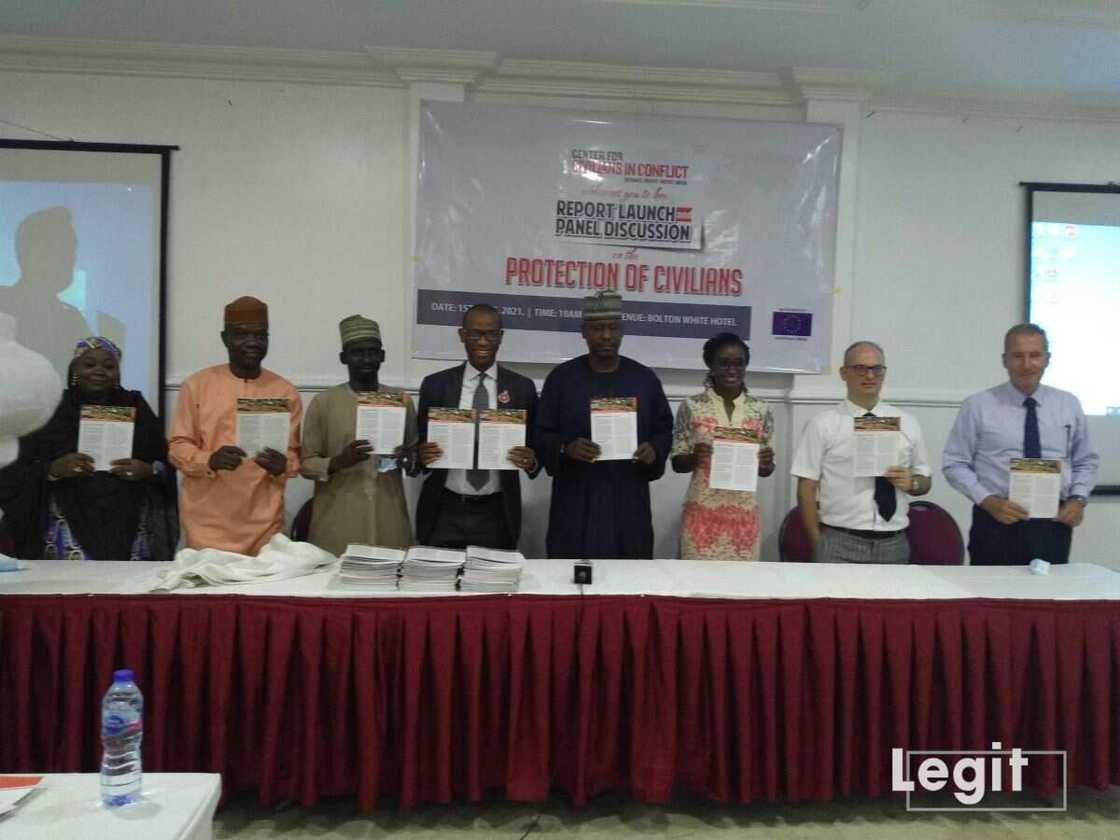
Source: Original
It also highlights actions that stakeholders of peacebuilding in these areas can take based on the research findings and analysis from the report.
PAY ATTENTION: Subscribe to Digital Talk newsletter to receive must-know business stories and succeed BIG!
Continuing Kolo said the state government is making efforts by ensuring that returning displaced persons are provided with all they need to survive, including a safe environment devoid of any form of attack or exploitation.
Kolo said:
"Sometimes when you leave IDPs in a smaller location, they become prone to attacks and all kinds of explorations."
"So what we do is that we ensure that the return of IDPs are voluntary and that is either by community reintegration, that is going back to their ancestral communities or choosing to stay in the metropolis - Maiduguri."
"In such cases with supporting the displaced persons with cash of N100,000 rent subsidy."
Kolo said the provision of rent subsidy also applies to both males and females who are heads of households.
She also noted that people who wish to go to their local communities, are provided with transport allowances, for and no-food packages and the state government will continue to deliver food and provide some basic items for a specific period of time.
In addition, Kolo said that before people are allowed to return to their communities or reintegrate into cities in the state, the state ensures that there is a robust local government area and stakeholder mass education and sensitisation of the people.
Further calling for knowledge sharing between states and stakeholders in humanitarian service delivery in crisis or conflict situations, Kolo said states like Sokoto, Katsina can learn from Borno to manage their current situation.

Read also
Uber, Bolt in trouble as House of Reps moves to probe ride-hail businesses in Nigeria over tax compliance
She said:
"This is so that these states do not make the kind of mistakes we made. It is also important that understand that they can let the conflict linger before humanitarian services begin."
For the district head of the Gwoza community, Ibrahim Ali Pulka, security operatives must work in collaboration with traditional leaders who are always in the right position to identify residents and visitors.
Pulka said there is a partnership between security operatives - especially the military and police in the community - when visitors or unknown persons gain access into communities, the people raise alarm through the traditional leaders.
He said:
"And this can serve as an early warning sign in the face of conflict situation. The traditional leaders known their people and they always know or get information whenever there's a new person around."
In his address, Benson Olugbuo, the country director for CIVIC said while the security situation in Gwoza town has improved years since 2015, there is a need to find ways civilians outside the town can be protected.
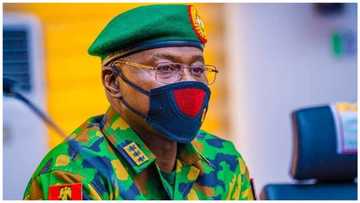
Read also
Killing of 322 police, 642 soldiers, indicate we are in very difficult circumstances, Northern Elders lament
Olugbuo said the Nigerian military had in 2019, adopted a ‘super camp’ strategy that consolidated smaller and more remote forward operating bases into larger and more fortified super camps.
He said some civilians in Gwoza town attributed the improved security situation in recent years to the super camp strategy, but civilians outside of Gwoza town continue to suffer protection threats.
He added that despite improvements in some aspects of the military’s behaviour towards civilians in Gwoza town, stakeholders have reported sexual exploitation and abuse (SEA) of women and girls by the Nigerian military.
After civilians and international non-governmental organisations reported cases of SEA to the military, actions were taken to reduce the rates of SEA.
He said, however, SEAs have continued to remain a major challenge in these areas.
Olugbuo said:
“Aside from the mixed feeling of returning home from IDP camps, civilians also had mixed feelings about the reintegration of former AOG combatants into the community."

Read also
Coca-Cola’s Project EQUIP Launches in Kano: Here Are 3 Areas the Initiative is Set to Tackle
"Some suggest that they are living in peace with ex-combatants because their consent was sought before reintegration, while others refuse to forgive them because of their alleged atrocities."
He further called on the Nigerian military to revise their current strategy to not only offer protection in super camps but also to extend protection to civilians beyond garrison towns.
He said that channels of communication between civilians and the military must remain open so civilians can report protection concerns, including SEA, and the military can quickly investigate and respond to these concerns.
He said:
“To better support, the return of IDPs, Nigerian federal and state civilian agencies should ensure the security situation in Borno state is conducive for safe returns and adopt a do no harm approach by ensuring that returns are voluntary."
"They should additionally encourage the use of traditional platforms to support and manage the increasing rate of surrendering combatants and their families who will require reintegration into communities."
ISWAP terrorists attack Borno community
Some suspected fighters of the Islamic State of West Africa Province (ISWAP) had attacked a remote village in the southern part of Borno state.
According to reports, the insurgents stormed Shallangba near Debiro in the Hawul local government area of the state on utility vehicles, shooting sporadically as villagers fled into the bush.
The villages were said to have scampered to safety as the terrorists invaded their domain in commando style.
Nigerian Army tells residents what to do after Maiduguri bomb blast
Fear and panic taking the centre state in Gomari and 1,000 Housing estates in the outskirts of Maiduguri, Borno state capital city.
The raging emotions and confusion is a result of an unexpected attack by members of the Boko Haram terrorist groups.
The terrorists invaded the community, detonating explosives that led to the destruction of property while leaving a young boy injured.
However, the military had urged residents in the community to remain calm and continue to go about their normal life activities.
Source: Legit.ng

